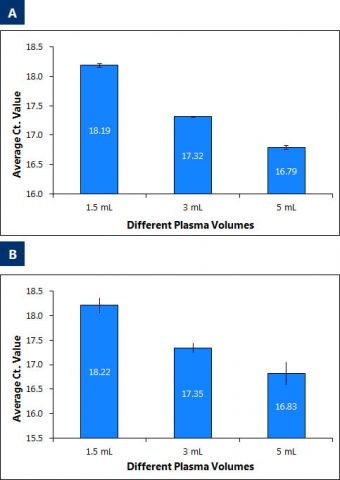Plasma/Serum RNA Purification Maxi Kit (Spin Columns), 2 - 5 ml sample input
| Specifications | |
|---|---|
| Product Category: | Circulating & Exosomal RNA incl. microRNA Purification |
| Sample Type: | Plasma, Serum |
Product Description
- Isolate all sizes of circulating and exosomal RNA, including microRNA
- Versatile plasma/serum input ranging from 2 ml to 5 ml
- No phenol extractions
- No carrier RNA
- Concentrate circulating RNA and Exosomal RNA into a flexible elution volume ranging from 50 to 100 µl
- Purify high-quality RNA in 35-40 minutes
This kit provides a fast, reliable and convenient method to purify and concentrate high quality, high purity and inhibitor-free cell-free circulating and exosomal RNA using a two column method. This kit can purify RNA from fresh or frozen serum or plasma samples prepared from blood collected on either EDTA or Citrate, from volumes ranging from 2 mL to 5 mL. Plasma samples prepared from blood collected on heparin should not be used, as heparin can significantly interfere with many downstream applications such as RT-PCR
The first column will handle the large volume input of bodily fluids that is followed by a concentration on a mini column for a final elution of 50 µl to 100 µl. All components for the purification and concentration are provided in one convenient and fast kit for the easy processing of large input volumes of bodily fluids. For a schematic workflow of the protocol click here.
The purified plasma/serum RNA is fully compatible with all downstream applications including PCR, qPCR, methylation-sensitive reverse transcription qPCR, reverse transcription PCR, Northern blotting, RNase protection and primer extension, expression array assays, and NGS.
Background
Plasma/Serum cell-free circulating RNA or exosomal RNA has the potential to provide biomarkers for certain cancers and disease states. Exosomes are 40 - 100 nm membrane vesicles, which are secreted by most cell types. Exosomes can be found in saliva, blood, urine, amniotic fluid and malignant ascitic fluids, among other biological fluids. Evidence has been accumulating recently that these vesicles act as cellular messengers, conveying information to distant cells and tissues within the body. These exosomes may play a functional role in mediating adaptive immune responses to infectious agents and tumours, tissue repair, neural communication and transfer of pathogenic proteins. For this reason exosomal RNAs may serve as biomarkers for various diseases including cancer. As the RNA molecules encapsulated within exosomes are protected from degradation by RNAses they can be efficiently recovered from biological fluids, such as plasma or serum.
Performance Data

Fig.1. Purification of cell-free circulating RNA and exosomal RNA from different plasma volumes.
Product Citations
- Tarca, A. L., Romero, R., Pique-Regi, R., Pacora, P., Done, B., Kacerovsky, M., Bhatti, G., Jaiman, S., Hassan, S. S., Hsu, C.-D., & Gomez-Lopez, N. (2020) Amniotic fluid cell-free transcriptome: a glimpse into fetal development and placental cellular dynamics during normal pregnancy. BMC Medical Genomics
- Wang, Z., Shan, Y., Yang, Y., Wang, T., & Guo, Z. (2020) MicroRNA-155 is upregulated in the placentas of patients with preeclampsia and affects trophoblast apoptosis by targeting SHH/GLi1/BCL2. Human & Experimental Toxicology
- Mittra I, Khare NK, Raghuram GV, Chaubal R, Khambatti F, Gupta D, Gaikwad A, Prasannan P, Singh A, Iyer A, Singh A, Upadhyay P, Nair NK, Mishra PK, Dutt A. (2015) Circulating nucleic acids damage DNA of healthy cells by integrating into their genomes Journal of Biosciences
- Catalog Number
56200-NB - Supplier
Norgen Biotek - Size
- Shipping
RT

